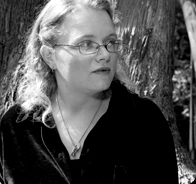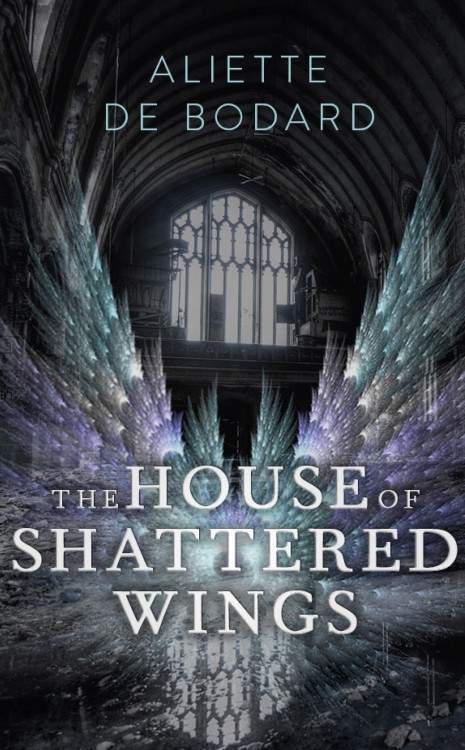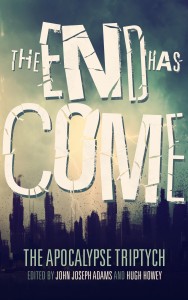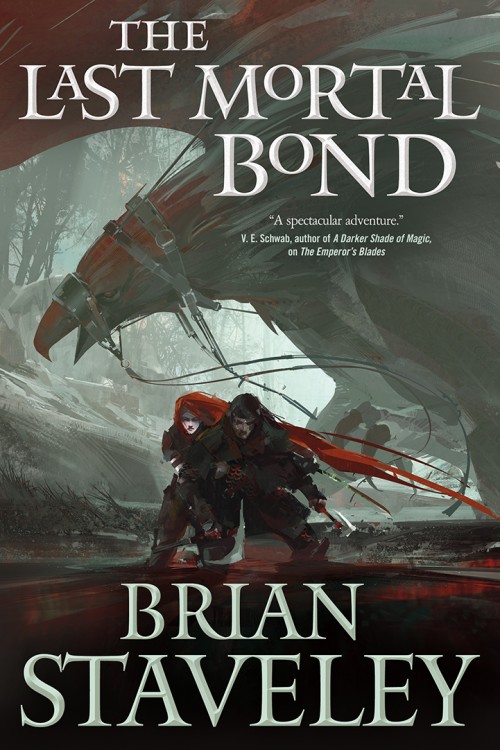
In collaboration with editors John Joseph Adams and Hugh Howey, A Dribble of Ink is proud to introduce a series of interviews with the authors of The End Has Come, the final volume in the The Apocalypse Triptych. Following on The End is Nigh, and The End Is Here, The End Has Come contains 23 stories about life after the apocalypse.
Interview with Ben Winters about “In the Woods”
“Heaven Come Down” tells the story of the sole survivor of a rapture that is not what it seems. Where did the idea for this story come from?
This whole process was new and interesting to me: I wrote BRING HER TO ME, my first story, for the first book in the “triptych”, with no real firm idea of how the whole thing would turn out, and then for the others I tried to stay on the path I had begin and see where it led. So the idea came from my own earlier ideas, I guess!
Robert intrigues me. Was his survival an attempt to mollify Pea regarding the loss of her world (an attempt that would later be repeated with her reanimated parents)? Or did he survive because of his expressed unhappiness with the voice of God and what it did to his people? Did that disapproval lead to disobedience, and would that make him a loose end that God needed Pea to tie up?
Probably, from the POV of “God,” of the voices that sort of run the show in this tale, Robert survived as long as he did to help maneuver Pea into the right emotional and logistical space she needed to be in when the end came. Of course there is always a question, when we’re talking about omnipotent or quasi-omnipotent beings, of why they chose Robert to be the vessel, but after all Pea is a kid, a sweet lonely kid just becoming a fully developed human, for whom a friend is a powerful force.
Do you consider what the others did to Pea’s world to be a mercy? On the one hand, they did convince (nearly) the entire population that their deaths would be worthwhile and a blessing. On the other, they accomplished it by tricking them into surrendering both their freedom and their will to live. As Robert pointed out, the entire culture became obsessed with their impending end. Is coming to peace with death worth sacrificing everything worth living for?
Short answer: no. Which is sort of my thing with religion in general, particularly heaven-centric or afterlife-centric religion—why would you spend even one precious minute of life on earth obsessing on some hypothetical life elsewhere, later? It’s funny because my Last Policeman trilogy dealt a lot with those questions, with this theme, and I thought it was all out of my system, but apparently it’s not.
Where does Pea go from here? Given the way the others lied to and manipulated both her and her people, could she come to trust and live with them? Should she?
In my mind, Pea ends up as a powerful ruler, an elite among the elites. Either because she is elevated to that status, or because she takes it by force. I think I just like the idea of my sensitive young heroin, who has changed over these three stories from naif to burgeoning power, completing that arc in the future.
What’s next for Ben Winters?
I am almost done with the first full draft of a new novel, called Underground Airlines, which will be out in 2016 from Mulholland, a crime/thriller imprint of Little, Brown. It’s a crime novel set in an alternate version of America, in which the Civil War was never fought.
About Ben H. Winters
Ben H. Winters is the winner of the Edgar Award for his novel The Last Policeman, which was also an Amazon.com Best Book of 2012. The sequel, Countdown City, won the Philip K. Dick Award; the third volume in the trilogy is World of Trouble. Other works of fiction include the middle-grade novel The Secret Life of Ms. Finkleman, an Edgar Award nominee, and the parody novel Sense and Sensibility and Sea Monsters, a New York Times bestseller. Ben has written extensively for the stage and is a past fellow of the Dramatists Guild. His journalism has appeared in Slate, The Nation, The Chicago Reader, and many other publications. He lives in Indianapolis, Indiana and at BenHWinters.com.
About the anthology
Famine. Death. War. Pestilence. These are the harbingers of the biblical apocalypse, of the End of the World. In science fiction, the end is triggered by less figurative means: nuclear holocaust, biological warfare/pandemic, ecological disaster, or cosmological cataclysm.
But before any catastrophe, there are people who see it coming. During, there are heroes who fight against it. And after, there are the survivors who persevere and try to rebuild.
Edited by acclaimed anthologist John Joseph Adams and bestselling author Hugh Howey, The Apocalypse Triptych is a series of three anthologies of apocalyptic fiction. The End Is Nigh focuses on life before the apocalypse. The End is Now turns its attention to life during the apocalypse. And The End Has Come focuses on life after the apocalypse.
Buy the book
The End Has Come is available as a trade paperback or eBook.






